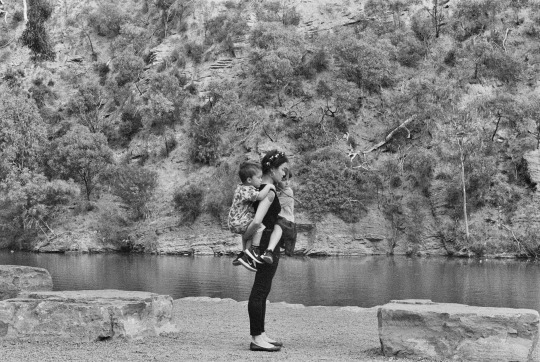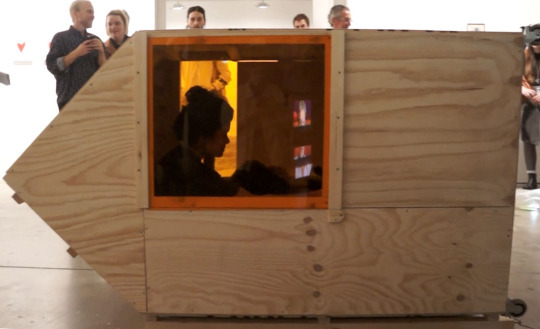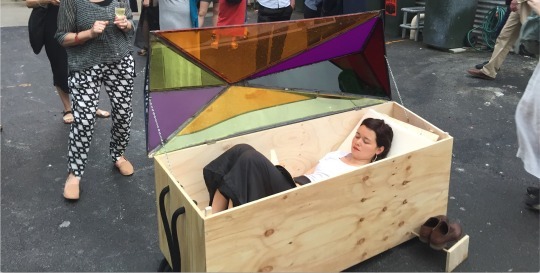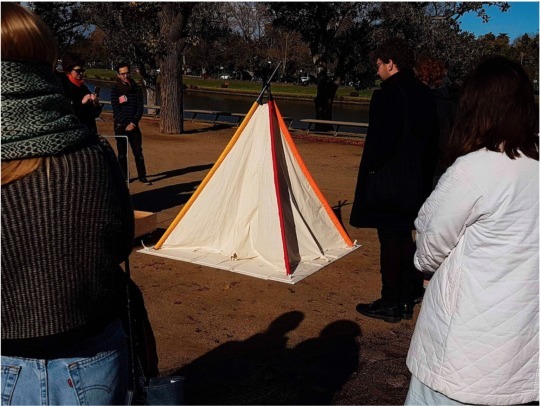#ig another tip is connect with professors
Note
Hey! Asking about your experience with being punk/punk adjacent and also in academia. How do you handle the two? Punk action and activism is grassroots, which I try to be involved in, but I feel like I’m just speaking big words and writing into an echo-chamber about gender. Like the only good I do is explaining to a group of cis people terminology. What are your experiences on this, if you have any?
Hmm. Yea this was difficult for me to balance too. I'll insert a readmore cuz this got kinda long.
I enjoy academia and research and being able to have more advanced conversations with people, but I was also sick of being in classes or circles of people who I knew would speak "woke" for the sheer fact of looking like good people, but on the down low were incredibly racist, classist, queerphobic, and just down right nasty carceral people. It was difficult trying to sift through who was safe to open up to and who wasn't, because many people were actually liberals in disguise (even if they called themselves leftists or leftist aligned). I also was never shy about being an anarchist/punk, I was the only person who wore my spiked jackets and boots to class, my outfits were loud, but I also began seeing some other queer people I knew wear their own jackets because they were encouraged by me (so that was nice).
I was doing activism on campus while in undergrad alongside the usual academic theory/research stuff, and it turns out that people actually will hate your guts the moment you start pointing out problems. The usual "YOU become the problem the second you point out THE problems", so I faced a lot of social backlash, even from other marginalized people who I had confided in about problems. My advice is that unless you're willing to become one of the most hated people on campus, don't do your activism on campus. It's a surefire way of making enemies, even enemies in people you have never met in your life. There are plenty of local orgs, food banks, and churches with programming that you could be way more productive in than trying to combat institutionalized oppression like that of an academic institution. You can try, believe me because I did, and while I learned a lot about organizing, I also learned when to give up and focus on my community instead of changing systems.
You pointed out that you're getting sick of explaining to cis people. This is definitely something you can stop doing, if you'd like. I stopped giving up my labor to educate other people (within reason) because I was one of the few trans people on campus. But I also have this value that I am not about to let some person walk around with the wrong idea about marginalized communities, so I always speak up when people say incorrect things (this has also caused some yt people to avoid me lol). Of course, you do this with compassion and with the goal of making sure their future interactions with marginalized people go better, but after a certain point, you need to be able to hold your energy for where you want to put it. Put more pressure on your institution or adjacent orgs to have things like safezone training (or bring in queer orgs for trainings/lectures). You can also just tell people some websites to check out instead of answering their questions, because surprise to them, their questions can in fact be solved by a simple search, they just are far too lazy to do that.
I dunno tho. I still struggle with growing so much in terms of punk/anarchist theory and ideas, but i have a serious lacking in actual community organizing. I'm introverted, don't like big noisy crowds, and I am quite socially anxious. Being punk is like my armor in a world that doesn't like me, because I find people fuck with me less when Im in spikes and boots. I find theory and academia so fulfilling for my virgo brain, but I also don't shame myself for not being active in local community. I know there will be a time I will be, but I also know that everyone is helping in the movement in the ways they can. It doesn't matter if that is at the food bank, in protest, on the computer, or by reading theory. All of it is equally important, and some of us aren't going to be good at everything.
I found myself feeling far more productive and alive when I was working with communities I knew would keep me safe. Started surrounding myself with more BIPOC queer people who were also working against carceral thinking, and I found my life to be way more enjoyable. connecting authentically with people who you feel safe with is just as important as organizing or protesting. You can organize or protest, but if you don't have a community to turn to, you'll burn out and won't be able to sustainably stay in the movement. Focus on energies, peoples, and love, connect authentically and have difficult conversations about love and politics and theory. You can be an academic, but still maintain the punk values you love in your daily life. Humans are made of contradicting values and experiences, we shouldn't shame each other for that and instead hold the multiple and contradicting truths in us all.
I can go on and on, but ill leave it at that. feel free to ask anything else in specific tho.
#muertoresponds#punk#ig another tip is connect with professors#many of my proffs were literally communists haha and i was their token anarchist#but many of them will have experience and even places for u to go to#ive been invited to many local organizings or dinners with groups by professors#never was able to go becuz of time and cuz i couldnt drive#but these are people with lived experience and theory on their belt
50 notes
·
View notes
Note
I just saw your rant and I am going into my second year as a Forensic Science major (essentially chemistry though) and the best advice I can give it is to make connections before. Even over the internet. By the time classes had started I was friends with almost half of my class on IG. Also remember to have fun and take time to yourself. I would usually take one day during the week where I did no work. Also, don't be afraid to to go out and explore. I go out of state and my two closest friends (who I met on IG and the Facebook group) would sometimes walk the city and find new restaurants and such since we were in the city. And some of the bedt times we had were just going to get food and sitting in one of our dorms for hours talking about the most random things all night. I can't lie and say it will be easy all of the time, but its helps to make connections with professors and join the groupchats for your classes so that you don't feel alone. Most proffessors are there to help. Another tip, you can have your anxiety documented as an disability with the school which will allow extra time for assignments and tests, something my roommate had to go through. Sorry if this is long but if you need any virtual support my DMs are open 🙂
Thank you for the advice! I’m working on the connections rn actually; I’m in a group chat with other people who are in my class. The thing is, is that I haven’t found anyone who’s also majoring in biochemistry. Hopefully I’ll find someone! Im working on connections with my professors, I don’t have a schedule yet, but I’m willing to build connections with them. It’s just in my nature to connect with the people around me, so that’ll be easy. I actually love getting to know my teachers because it’s fun and it helps in the long run😂😂
And yes—I absolutely understand that it’s not going to be easy all the time. I’m not even gonna lie, I’ve shed my fair share of tears during high school, I’m not surprised if I shed a few more in college :) Also, I didn’t know about that anxiety thing! I know we have something for disabilities, but I didn’t know anxiety counted for it!
And thank you again for this! It’s so kind of you to give me this advice and being so open to my questions🥺 All of this advice from all of you has helped me and my nerves. I’m feeling a bit more confident in myself when it comes to college.
2 notes
·
View notes
Text
MEET THE FAC 2019 RESIDENCY ARTISTS: CLAUDIA PHARES

Can you expand on the concept of “voluntary isolation”? What does that mean to you in terms of your autobiography and how do you see it impacting other artists or people in your community?
I started to explore voluntary isolation in late 2015 as a result of experiencing a sense of loss of privacy, having become a parent. Which is not uncommon for new parents. I became obsessed with artists who explored voluntary isolation, nomadism and self-sufficiency such as the Israeli-French artist Absalon and the American artist Andrea Zittel. Inspired by their self-containing minimalist structures, I built a series of works I could inhabit and enact a sense of ‘escapism’. I cannot easily shake off the village.-Thoreau (2016), Self-Care (2017), Tent (2017) were the resulting works.
In my twenties, I spent several summers working for a reforestation company in Canada as a tree planter and later, as a head cook. Depending on the contract, we would travel to remote areas across Northern Ontario and Northern Alberta. We would set up camp and live in tents for up to six weeks. I always liked to travel and I loved the nomadic lifestyle of the job. The travel bug stuck with me. In my late twenties, I went back to university to study nursing and a year after I graduated, I decided to move to Australia to work as a nurse.
I believe that in order to feel happy about oneself and ultimately with others, we all need some time alone to reflect and to recentre. I realized it is not necessary to extract yourself from your immediate environment to achieve this. You can still disconnect/recenter while being in a public place. As much as aloneness is important, so is feeling connected with others. Becoming a parent can be extremely isolating and very intense. For me, a lot had to do also with a sense of loss of control. Furthermore, becoming a mother has been confronting for the major shift in roles and responsibilities and overall identity. There is a pressure exerted by Western culture to be a certain way as a mother which undermines a mother’s needs and desires. I believe motherhood still remains marginalized and undervalued in the eyes of patriarchy. In view of challenging how motherhood is perceived in our society, I used the voluntary isolation strategies of Absalon to highlight the invisibility of motherhood.
My body of work on voluntary isolation was acknowledging how common life-changing experiences such as motherhood can be isolating and how the social constructs surrounding motherhood can be unrealistic and potentially detrimental to the ones subjected to it.

“I cannot easily shake off the village” Performance Still, Thoreau, 2016
In terms of your social practice, do you find it creates lasting communities or it ephemeral? Is community building important to your workshops?
Since having become a single mother of two young children, I moved my practice from individualistic to a more socially engaged one. I wanted to reach out to other artists/parents in order to share and compare ways to maintain an art practice as an artist/parent. Voluntary isolation became less of a priority for me to explore out of necessity to survive and thrive.
There are lots of artists/parents who experience undesired isolation and who would benefit from being part of a community. In building a community would raise awareness on the recognition and validation of the artists’ other roles and responsibilities in our society and how those ultimately contribute to contemporary art.
I found that the projects that involved interacting with an audience had a lasting impact. I hosted two sun printing workshops where artists, who were also parents, were invited to attend with their children. Artists/parents not only bonded with their children while making art but also had the opportunity to make new connections with other like-minded individuals. During one sun printing workshop entitled How do we do it?, I orchestrated a roundtable discussion where the participants were invited to write a letter to oneself or to another artist/parent that could include tips, reflections, and/or words of encouragement on how they maintained their art practice while raising children. These handwritten notes were then printed on light-sensitive paper.
Through such participatory events, I am interested in developing a network of artists/parents who can support and empower each other in their everyday lives as artists/parents. Until one artist/parent finds their new rhythm navigating their roles and responsibilities as artist and parent, there will be multiple occasions where one will feel defeated, frustrated, and doubtful about maintaining their art practice while raising children.
Another event I have been organizing involves hosting a dinner where a small group of artists/parents would be invited to attend with their children if desired. I would cook and serve a meal, and then facilitate a discussion following these questions: How do you maintain your art and parenting practices? What have you found to be helpful or not helpful in doing so? This event would run like a performance similar to the dinners hosted by the international artist Rirkit Tiranavija in the 1990s in New York.

“Self-Care”, Preformance Still, 2017
What artists or authors are you looking at in terms of research into the patriarchal idea of motherhood? Are there any artists also working to deconstruct motherhood that inspire you?
In my research, I discovered Andrea O’Reilly, Professor in the School of Gender, Sexuality and Women’s Studies at York University. She is also the founder and director of the Motherhood Initiative for Research and Community. She coined the term “matricentric feminism” which is defined as mother-centred feminism which views motherhood to be socially and historically constructed. It challenges the assumption that maternity is natural to all women and that the work of mothering comes from instinct rather than intelligence and skills.
My ongoing research is framed by matricentric feminism. I view mothering as a discipline just as my art practice is; both disciplines involve work and thinking and are not mutually exclusive. Each role informs the other.
In terms of artists who have inspired me, the multidisciplinary artist Lise Haller Baggesen has been a great discovery in my practice after reading her book Mothernism. Part-fictional part-critical writing in the form of letters, various issues are explored surrounding motherhood, art, and politics which are all interconnected with disco trivia. I have been greatly inspired by this artist’s original approach in asserting the presence of the mother in the contemporary art world through her writing.
As I incorporated elements of trans/performance into my practice, I wanted to develop creative strategies to bridge the ‘private’ associated with motherhood into the public sphere. The multidisciplinary Canadian artist Laura Endecott is an artist whose work I found valuable in terms of performing motherhood using trans/performance. In her essay, Performing the Maternal in Public Space, she speaks about the idea of transference as key to her public performances as it enables discourse surrounding the invisibility of motherhood. Like Endecott, the American Mierle Laderman Ukeles is also concerned with overlooked tasks of motherhood‘s contribution to society. Ukeles’ seminal performance work Maintenance Art Works 1969-1980 achieved to shed some light on these concerns.
There are more artists who have successfully managed to explore motherhood beyond the private space and hopefully, more will follow.

“Tent” Performance Still, 2017
Follow Claudia:
@Claudia Pharès on FB
@claudiaphares on IG
claudiaphares.com
#claudia phares#feminism#feministart#feministartists#feministartresidency#toronto#torontoart#torontoevents
2 notes
·
View notes